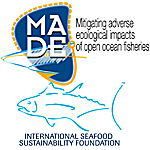Floating objects, known as fish aggregating devices (FADs), are used in both purse seine and pole and line tuna fisheries, and can be either anchored to the ocean floor or drifting at sea. In purse seine fisheries alone, more than one third of the world's tuna is caught in association with naturally occurring and manmade floating objects.
While the efficiency of FADs is well documented, there are many aspects that remain unknown, largely due to a lack of reliable data. For one, there is no educated estimate of the number of FADs currently drifting or anchored at-sea. This knowledge gap makes it difficult for fishery management plans to effectively address the use of floating objects. As a result FAD management has been extremely limited, mainly restricted to closures and bans in instances where the fishery may be negatively impacting a targeted tuna population.
In 2012, the International Seafood Sustainability Foundation (ISSF) developed and launched FADTrak, a new tool that gathers information on an individual vessel's deployment, usage and recovery of FADs. This life cycle information is critical to developing better management plans. The FADTrak electronic logbook application utilizes touch screen and GPS technology to help industry collect credible data itself and submit the information directly to regional fishery management organization scientific bodies.
The discussion "On the fast track to managing FADs" will explore where the technology is being used and how ISSF is working with the processing sector to encourage vessels to adopt FAD logbooks as a standard operating procedure.
- Presentation

 PDF version
PDF version
